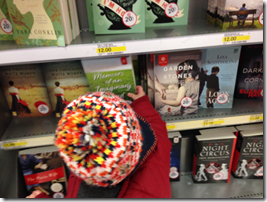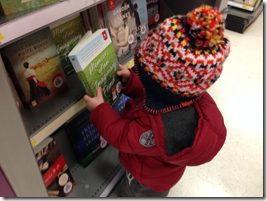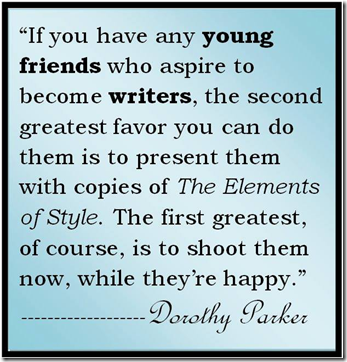Matthew Dicks's Blog, page 419
February 1, 2014
Sheryl Sandberg made me feel like a misfit
I’ve watched Sheryl Sandberg’s TED Talk which inspired her book, Lean In, but I have yet to read the actual book, so it would be foolish of me to criticize any of the arguments that she makes therein.
I suspect that I will agree with a lot of what she argues in the book (which I have on audio and will listen to soon) but not all. I have some very specific thoughts on the behavior of men and women in the workplace that I suspect will clash with Sandberg’s ideas, but that is for a different day.
However, in watching this follow-up to her initial TED talk and the book, I found myself annoyed by two of her statements.
Sandberg claims that less than 5% of men are accused of being too aggressive at work. She also says that she has never met a man who has been asked the question, ‘How do you do it all?”
I have been accused of being too aggressive at work many, many times, and I am asked, “How do you do it all?” almost daily.
If this is an exaggeration, it is of the slightest variety.
Is it true that women are accused of being too aggressive at work more often than men?
Maybe.
Is it true that women are asked how they manage to do it all more often than men?
Probably.
But the same kinds of generalizations and assumptions that harm women in the workplace should be avoided in regards to men, too, and I think Sandberg should know better.
My wife claims that I am an anomaly in both of these respects. She believes that my perceived aggression is the result of a workplace that is more than 90% female (which, if true, raises many other gender-specific questions), and she argues that the constant barrage of “How do you do it all?” is unique to me.
While I doubt that it is unique to me, it is probably uncommon, but why alienate me and others like me with the implication that no man has ever been asked that question?
Also, I would like to ask Sandberg that if I am truly rare in both of these respects, what does this say about me?
Should I be leaning in more often, too? Am I, too, being marginalized in the workplace? If these are truly signs of a problem, how am I being negatively impacted as a man who experiences conditions similar to women, at least in these regards?
Much improved without me
Yesterday I posted my new favorite photo of my daughter, Clara, wearing a straw hat, her mother’s boots, her lucky pants and her beloved pony short.
My only complaint was that I was standing in the background, looking like an idiot and ruining the picture.
So one of my friends removed me from the photograph entirely. Much improved!
Resolution update: January
1. Don’t die.
I kick ass at not dying.
2. Lose ten pounds.
Three pounds lost in January.
3. Do at least 100 push-ups and 100 sit-ups five days a week.
Better than done. I completed six days a week in January.
4. Launch at least one new podcast.
Author Out Loud, my initial podcast, has yet to launch because of technical and scheduling issues, but my February vacation is now the targeted date for our first recording. Once we have that podcast running smoothly, we can think about adding a second podcast.
5. Complete my sixth novel before the Ides of March.
I’m writing as fast (and as well) as I can. I love this book.
6. Complete my seventh novel.
I’m also writing this one, which may or may not be a mistake.
7. Sell one children’s book to a publisher.
I received feedback from a children’s book editor on my latest attempt at a children’s book, The Little Bad Wolf. I’m working on revision now.
8. Complete a book proposal for my memoir.
I made a decision to reduce the scope of my memoir and focus primarily on the two years that encompassed my arrest and trial for a crime I did not commit. Those two years also include an armed robbery, the onset of my post traumatic stress disorder, my bout with homelessness and the time I spent living with a family of Jehovah’s Witnesses.
I think a reduced cope will make for a better memoir and open the door to future memoirs on the other times of my life.
Work has begun on this project.
9. Host at least one Shakespeare Circle.
Nothing scheduled yet. Probably a good summer project.
10. Write a screenplay.
I have looked into purchasing Final Draft, the software required to write a professional screenplay. Thanks to a friend, I also know what my first scene will be. So that’s progress. Right?
11. Write at least three short stories.
I can’t believe that I included this on the list. I was ambitious. Perhaps overly ambitious. No progress.
12. Write a collection of poetry using existing and newly written poems.
No progress.
13. Become certified to teach high school English by completing one required class.
One class and $50 away from completion. Hopefully a class that I can find and complete over the summer.
14. Publish at least one Op-Ed in a physical newspaper.
No progress.
15. Attend at least 10 Moth events with the intention of telling a story.
I attended three Moth events in January. Two events were GrandSLAM championships (where I told stories), and the other was an event at Trident Books in Boston where I told a story at the opening of a program designed to promote their book.
16. Win a Moth GrandSLAM.
I competed in two Moth GrandSLAMs in January. I finished in second place by a tenth of a point in the New York slam and was randomly chosen to go first in the Boston slam, dooming any hope I had for victory.
I have future GrandSLAMs in both Boston and New York based upon previous StorySLAM victories, but after five GrandSLAMs and three second place finishes, I’m beginning to feel a little jinxed.
17. Give yoga an honest try.
No progress.
18. De-clutter the basement.
No progress.
19. De-clutter the shed
No progress.
20. Conduct the ninth No-Longer-Annual A-Mattzing Race in 2013.
No progress.
21. Produce a total of 6 Speak Up storytelling events.
Elysha and I produced our first Speak Up event in January. It was an enormous success. We sold out the theater again, and I think it was our best show to date.
22. Deliver a TED Talk.
I am scheduled to deliver a TED Talk in March in Somerville, MA.
23. Set a new personal best in golf.
No progress until the spring arrives.
24. Find a way to keep my wife home for one more year with our children.
Unfortunately,, this is looking doubtful.
25. Post my progress in terms of these resolutions on this blog on the first day of every month.
Done.
January 31, 2014
My new favorite photo of my girl
Straw hat. Unicorn shirt. Lucky tights. Mommy’s boots.
Stupid lug standing in the background, but still.
January 30, 2014
Good news! America’s second favorite book is an actual book.
More good news about the publishing industry.
In 1900, America’s second favorite book (after the Bible) was the Sears Roebuck Catalogue.
In the most recent Pew poll, America’s second favorite book (still trailing The Bible) was Gone with the Wind, followed by the Lord of the Rings trilogy, the Harry Potter Series and Stephen King’s The Stand.
Note the absence of catalogs in the list
Every time I hear someone proclaim the death of the book, I will remind them that in 1900, America’s second favorite book was a catalog. For all the problems that the publishing industry has, at least our readers are naming actual books in these most recent polls.
We’ve come a long way since 1900.
I like their bagels, but this doesn’t inspire a return visit from me
January 29, 2014
The Moth: Trigger Pulled
The following is a story that I told at a Moth GrandSLAM at The Music Hall in Williamsburg in March of last year.
The theme of the night was The Tipping Point. I told a story about an armed robbery that I experienced while managing a McDonald’s restaurant.
I finished in second place.
The Moth: Armed robbery
The following is a story that I told at a Moth GrandSLAM at The Music Hall in Williamsburg in March of last year.
The theme of the night was The Tipping Point. I told a story about an armed robbery that I experienced while managing a McDonald’s restaurant.
I finished in second place.
My boy has good taste.
January 28, 2014
An unexpected silver lining (including butts with wings) in this brave new publishing world
In the last five days, I have:
Corresponded with my French translator about the French edition of my book and future books.
Responded to questions from readers in Mexico, Thailand, Argentina, Germany and Turkey, as well as four states within the United States.
Assisted in the publicity of my book in Italy and France by creating material for their online portals.
Contributed a Q&A to a book blogger in Michigan.
Received an email from a reader who explained how a single sentence in Memoirs of an Imaginary Friend has changed her relationship with her daughter for the better.
Yes, it’s true that there are fewer bookstores today. Less shelf space for books. And yes, advances are shrinking. Competition for readers’ attention is increasing exponentially. More books are being published today than ever before.
It’s becoming more and more difficult to sell a book.
Every six months or so, I read another piece asking if the novel (or even the book itself) is dead.
None of this is good. It is extremely difficult to make a living as an author today. A 2014 Digital Book World and Writer’s Digest Author Survey revealed that 54% of traditionally-published authors earn less than $1,000 per year.
A quote from Dorothy Parker gained from traction on social media last week that captures the challenges of earning a living as an author well:
I have been exceptionally fortunate. I have published three novels in 6 years and my fourth book should hit bookshelves later this year. My most recent novel, Memoirs of an Imaginary Friend, has been published in 24 countries worldwide, and all three of my books have been purchased by international publishers.
Despite my good fortune, I would not be able to survive without the salary that I earn as an elementary school teacher. Though I love my job as a teacher and couldn’t imagine giving it up, there may come a time when I would like to devote all of my energies to my writing, but I don’t know if that will ever be possible.
And once again, I have been exceptionally fortunate.
But if I’m searching for a silver lining, it can be found in these last five days.
Never before have authors been able to reach readers as easily as we can today. The Internet has brought me just as close to my readers in Thailand as I am to readers one state away.
Thanks so the ease of online translation, I am able to communicate with these readers, even when we speak different languages. Yes, the sentences can be a little janky at times, but we are able to communicate without the assistance of a paid translator.
This evening I will be visiting with a book club in Ohio via Skype. About a dozen women will jam themselves into a living room and ask me questions about my work and my life while I am sitting at my dining room table in my pajamas.
Last month I visited with a book club in Riyadh via Skype. I pulled my car over to the side of the road, opened Skype on my phone and chatted with half a dozen women on the other side of the world about literature and writing.
Last year I participated in a literary festival in Italy by delivering a talk on a large screen via Skype to an audience of more than 200 people.
Other than a honeymoon in Bermuda, I have never left the United States, but I have spoken to readers in more than 30 countries in the last two years.
There’s more.
I am able to take the stage in New York or Boston, tell a story to an audience of 300-1,000 people and then post a video of that story onto my YouTube channel for my readers around the world to see. This month students at a college in Niskayuna, New York will be watching these stories on YouTube as part of a lesson on “distinguishing between experience from what we take-away from that experience.”
Perhaps a few of them will buy a book.
These are difficult times for authors who want to make a living by writing. They are even more difficult for authors with families to support. Unless you have written a bestseller (and maybe two) or sold your novel to Hollywood, it is likely that you are going to need a “real job” or a supportive spouse in order to spend your days writing.
But the challenges that the Internet and the digital world have brought to the publishing industry have also brought new and exciting opportunities. The ability to visit with a book club in South Africa or exchange emails with a class of students in Denmark will never make up for the disappearance of book stores, the shrinking of book shelves and the reduction in advances and loss of royalties for authors.
But on those days when the writing is hard and the editing is harder, and I and begin to wonder if I will ever be able to make a living writing books, an email or message through social media always seems to arrive at just the right moment, from some obscure corner of the world, thanking me writing a book, or telling me how my words have changed a life, or asking me to discuss the epilogue of my latest novel or inquiring frantically about my next book.
These messages do not pay the bills. They do not allow me to remain at home every day, toiling over sentences and filling plot holes. But they lift my spirits. They energize me. They remind me of why I started writing in the first place. They remind me of why I continue to write and would do so even if no one was paying me a dime.
Sometimes it’s as simple as a tweet like this that sends me back to the laptop with excitement and hope:
@ibieberavons I miss my book “The memoirs of an imaginary friend” ….whoever who stole it … i pray that your butt grow wings -_-












